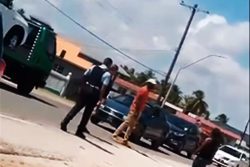Dear Editor,
The Minister of Home Affairs, Mr Clement Rohee, loomed large as a figure in the July crisis of 2012 in Linden, Guyana. Three people were killed by gunfire and over 20 others were injured by firearms.
There was outrage at the news. The Government of Guyana told the OAS, “Agreement (ie, on the electricity tariff increase) was reached on April 19, 2012, and this was announced on the same day in the National Assembly by the Prime Minister with the concurrence of the Leader of the Opposition, On April 20, 2012, the Leader of the Opposition reneged on the agreement.” The December 2012 statement of the government to the international community blamed the July 18 death and injuries at Linden on people “inflamed by the opposition parties…” It seems that APNU agreed in the name of the people without consulting the people of Region 10 and then corrected itself when the people rejected the high-handed decision.
The government had been in office for 20 years and should have known the proper Region 10 authorities to bargain with, rather than bargain with proxies. This is a hangover of the political culture developed in post-independent Guyana, where the party is everything and everyone is a bargaining chip. Both of the parties to the agreement, claimed by the government and not acknowledged by the other showed a surprising lack of respect for the people who really had to pay the electricity rates. They both believed, falsely, that the people had handed over their destinies to the parties. Neither party to the so-called agreement cared to find out about the history of disputes in that part of the country. By sheer chance, a new USA publishing entity has just reissued. The Bauxite Strike and the Old Politics, a 1972 book written close to the 1971 workers’ revolt in Linden. There was no attack on the book when it was first published in 1972. A hint to the Prime Minister: It is too late now to discredit it from memory.
Whenever and wherever there is a fatal shooting by the police, the Minister of Home Affairs cannot be left out. One possible test of the Minister’s efficiency is this. For the first time in recalled history the police officially denied shooting.
One good measure of the Minister’s management of his ministry is the fact that the acting Commissioner of Police expressed the view that shooting was unnecessary. There was conflict among the police witnesses.
To me the fact that the Minister was not on the spot is not important. He does not have to be on the spot to be responsible. The President charged the Minister with responsibility for the police under Article 107. The Minister cannot escape political and constitutional responsibility. The Police Act says, “The Commissioner shall subject to the general orders and directions of the Minister have the command and supervision of the Force and shall be responsible to the Minister for peace and good order throughout Guyana.” (Section 6). This is not on the face of it criminal responsibility. Evidence must establish criminal responsibility.
The Minister denied speaking to anyone on the spot that day July 18. He must have known that since the Commissioner was responsible to him, he as Minister could not be taking reports from or de-briefing an officer below that rank and present at the scene. The Commissioner is responsible to him. The Minister had said that the police radio did not have the range to allow him to have a conversation with police officers on the scene in Linden. This would rule out any conversation or meddling by the Minister, Was that an attempt to distract focus on his actions? Then when advocates presented the evidence of recorded phone records, it turned out, and he admitted that he had used other means than the police radio. It was established that conversation took place after the shooting. The police radio was a red herring.
The allegation that the Minister gave orders to shoot has not been followed up. The government’s case is that the Minister spoke to some officer on the spot only after the shooting. Observers should note that the Minister’s statements are important in and out of the Inquiry. A Minister, having taken the oath of office, is always on oath while discussing official business. He does not have to take the witnesses’ oath to be on his oath.
Mr Rohee testified that he had discussions with the Commissioner of Police the day before the Linden shooting and in relation to the situation at Linden. He is allowed to do that under the Police Act. The law involves the Minister even more deeply. Section 3 (3) of the Police Act provides: “It shall be lawful for the Minister to cause to be issued arms and ammunition to the Force and for any member thereof to use the arms and ammunition for the purposes of sub section (2)”; (2) includes “the detection and prevention of crime, the suppression of internal disturbances, protection of property and the due enforcement of all laws…”
The lack of comment on the Minister’s conduct after the shooting is disturbing. If the Commissioner of Police is responsible to him for such matters and the Commissioner was not there, on the scene, it is extremely untidy for the Minister to hold conversations with any officer on the crime scene, especially after the incident. Worse still, in my opinion, the content of the conversation was not disclosed and questioned. It was highly irregular and cannot be a privileged conversation in a matter where lives were lost. If the conversation had the status of a privileged conversation, or state secret, the Commission of Inquiry will certainly pronounce on it for the benefit of Guyanese of all political sections and the watching world.
Yours faithfully,
Eusi Kwayana









